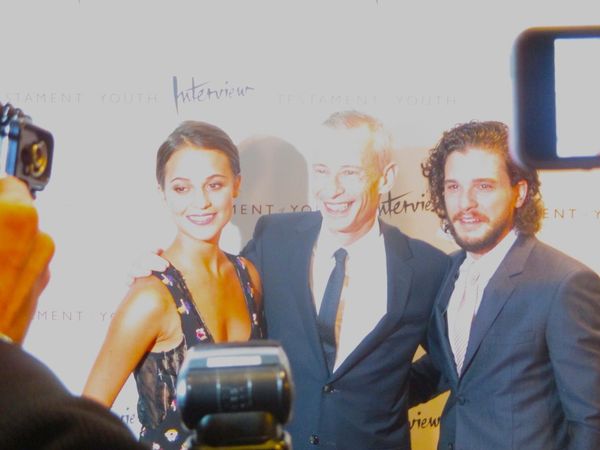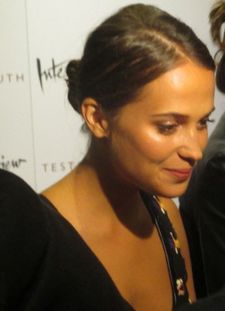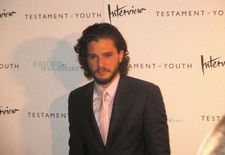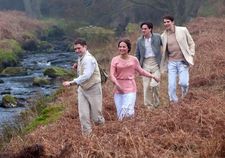 |
| Bright lights, big city with Alicia Vikander, James Kent and Kit Harington Photo: Anne-Katrin Titze |
Interview Magazine's New York première of Sony Pictures Classics’ Testament Of Youth, directed by James Kent, starring Alicia Vikander as Vera Brittain and Kit Harington (Game Of Thrones) as her fiancé, Roland, was held at the Bow-Tie Chelsea Cinemas.
Vikander, right after coming out of Alex Garland's penetrating artificial intelligence tale, Ex Machina, in which she stars with Oscar isaac, Domhnall Gleeson, and Sonoya Mizuno, entered into this First World War drama, based on Brittain's memoir.
 |
| Alicia Vikander on Vera Brittain's memoir: "I think the story of the book and this film really tells another side to the story." Photo: Anne-Katrin Titze |
Michael Fassbender was spotted with the cast, producer Rosie Alison, Michael Barker and Tom Bernard at the Hotel Americano after party. Photographer Michael Avedon, grandson of Richard Avedon and Tara Subkoff, wife of Urs Fischer fresh from promoting her film #Horror at the Cannes Film Festival, were among those who joined in on the red carpet.
Vera in Testament Of Youth, more than anything, longs to be one of the boys. She convinces her parents to let her take the Oxford entrance exam, an exceptional feat for a woman in the teens of the last century, that automatically labels her a Suffragette and bluestocking. She competes with Roland in writing poetry and when she finds out, too late, that the entrance exam requires an essay in Latin, she thinks quickly on her feet and, having nothing to lose, writes it in German. The language skill becomes important later, during the war, when she volunteers as a nurse at the front, giving up her "golden opportunity" at Somerville College, Oxford.
Youthful decision making, the nature of friendship and competition, programmed disconnect and fun on balmy summer afternoons link the century-old past to the present.
When I spoke with James Kent earlier in the day at the Crosby Street Hotel on the structure of his film, beginning with Armistice Day 1918 and then going back four years, he commented: "Everything I took as a decision has to do with how is Vera? Does she see the outside world? Is she able to see the beautiful landscape when she is a girl? Of course she is. She loves nature. She loves flowers. She loves swimming. By the time she gets to the war, she is dealing with her own demons and hence the framing tightens."
He continued, "It is about experience. As Roland says to Vera early on when they're beginning to fall in love. She says: 'I want to be a writer.' And he says: 'Don't you need some experience first?' That's the key word. And in the end, she understands what he meant. Life is about experience, good and bad. That is just the life we are given."
 |
| Kit Harington on Roland at the beach: "That's the moment where he sort of throws her down and hallucinates." Photo: Anne-Katrin Titze |
Anne-Katrin Titze: You mentioned that you were interested in history and especially the time period around World War I before this project. Was there something that surprised you? A fact that you didn't know about?
Kit Harington: I was researching. I knew a little about the war. I didn't know so much about PTSD, about Post-Traumatic Stress Disorder that many soldiers came back with from the First World War, for obvious reasons. And I wanted my character to have that at a certain point in the film. So I did some research on it and it was quite illuminating.
AKT: The scene at the beach when Roland comes home on leave is brilliant. Was that the one you were thinking about?
KH: Yeah. That's the moment where he sort of throws her down and hallucinates.
AKT: How did you do your research?
KH: Like everyone does now, you go on the web.
AKT: It all depends where you go on the web.
KH: Yeah, it depends where you go on the web. But there's some horrifying video out there of men from the First World War coming back with Post-Traumatic Stress that comes from shell shock. What I chose to do was more of a confinement thing. I wanted him to have claustrophobia.
_225.jpg) |
| James Kent on Vera (Alicia Vikander): "Does she see the outside world?" |
I wanted him to go from hallucinating that [Vera] was someone that she wasn't, to not being able to get out of his clothes. To get out of his uniform. And also to be completely unaware of where he is all of a sudden. I thought that was quite interesting as something to play with.
AKT: It is such a fascinating scene because Vera manages to get through to you.
When differing traumatic war experiences separate the genders, Vera, in her own way, manages to be on both sides and not a part of any traditional order.
KH: Yes she does. She connects.
AKT: She does connect through poetry.
KH: She settles him. She grounds him. It's very unusual at that sort of time to see a man break down or cry. They just wouldn't show that side of themselves. So it was a chance to explore that in a period piece as well, which is exciting.
AKT: Is there any family connection to the First World War? Any pictures of great-great-grandfathers you had and looked at?
KH: My great-grandfather on one side won a military medal. He was a doctor and he won it for going out and assisting dying men. And on my other side, on my father's side, my great-great-grandfather was a General. So he was ordering men to war. So I had two different sides there.
AKT: How did that feel in preparation? Did you connect to these men?
 |
| Edward (Taron Egerton), Vera (Vikander), Roland (Harington), Geoffrey (Jonathan Bailey) |
KH: Yeah. What I know about them, they were both very good men. Even the General. We look back with some distaste at World War I Generals, but apparently he was quite a good one. General Harington.
AKT: What was his first name?
KH: I can't remember what his first name is. General Something Harington. Probably Richard.
Anne-Katrin Titze: Everybody learns about World War I in school. What surprised you the most when you took on this role?
Alicia Vikander: With this it was the fact that you read about it in school, you see films, documentaries, but I was surprised when I realised that I hadn't read anything from a female perspective like that. A lot of what happened out in the field but not so much about the people who were left behind, which was half the population.
They let the young boys of the families go out to war and they had to stay back. Especially with this, I was reading about the big start in the female kind of revolution, the feminist revolution when the women had to kind of step into the men's shoes when most of them were gone. I think the story of the book and this film really tells another side to the story that people are not already familiar with.
 Vera (Alicia Vikander)_225.jpg) |
| Roland (Kit Harington) and Vera (Alicia Vikander): "She says: 'I want to be a writer.' And he says: 'Don't you need some experience first?'" |
AKT: Did making this film inspire you to do some research on your family? Maybe what your great-great-grandmother did during the time of World War I?
AV: We weren't in World War I.
AKT: Because your family is from Sweden. Do you know anything about what they did a hundred years ago?
AV: Of course on the time I reflected but I didn't go back and searched in my own family. My grandparents had already passed away when I was born. I wish I had the chance to meet them but I didn't.
More coming up with James Kent on and off the red carpet on costume designer, Consolata Boyle, what getting Joanna Scanlan meant to him, turning Alicia from Ava into Vera, and coming on board with David Heyman, the producer of Paddington, the multiple Oscar and BAFTA winning Gravity, and the Harry Potter films.
Testament Of Youth opens in the US on June 5 and had its world première at last year's London Film Festival.





















